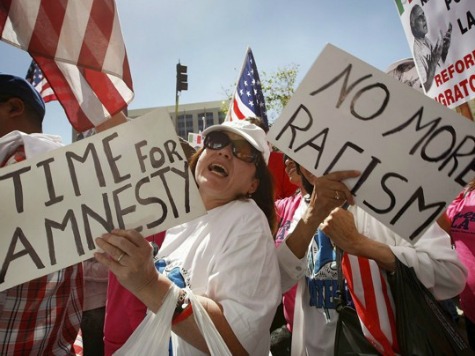
This past weekend, several thousand people gathered on the National Mall to commemorate the 50th Anniversary of Martin Luther King’s “I Have a Dream” speech. In the powerful address, Dr. King envisioned a society where the “content” of a man’s character meant more than the “color of his skin.” Events this weekend, however, prominently featured activists for amnesty for the country’s illegal immigrants. It is a separate issue that tarnishes Dr. King’s legacy.
Janet Murguia, President of the National Council of La Raza said at the weekend event, “We march so that everyone knows that true justice must include enacting comprehensive immigration reform.”
The civil rights movement was about securing full constitutional rights for existing American citizens. Many parts of the country shamefully restricted the rights of minorities, generally black Americans. Even where the law was written to treat races equally, enforcement was often unevenly applied. King’s work, and the broader civil rights movement, was addressing this moral wrong.
The amnesty movement, by contrast, is about securing constitutional rights for people who broke the law to enter the country. Advocates want to frame the debate in the context of civil rights, but it is a false comparison. The push for amnesty isn’t about securing rights for immigrants, but about showing favor on people fortunate enough to live within access to a land border with the US and determined enough to ignore the nation’s immigration laws.
There are currently over four million immigrants waiting in line in their home countries to enter the US legally. Shouldn’t these hopeful immigrants take precedence for the simple fact that they complied with US law? What nature of “civil right” favors those who break the law over those who don’t? Doesn’t complying with the law give us some measures of Dr. King’s “content” of character?
There is room for an overall debate on the proper amount of immigration and what measures we use to grant citizenship. Any civil right aspect of this debate, however, was buried long ago with the repeal of California’s and other states’ laws against Chinese and other Asian immigrants.
Even ardent opponents of the current Senate amnesty legislation aren’t advocating that the nation should deny immigrants’ rights. They argue that we should uphold and enforce existing law. Further, that the law ought to be applied equally to Americans and those hoping to become Americans. That is the cherished legacy of Dr. King.

COMMENTS
Please let us know if you're having issues with commenting.